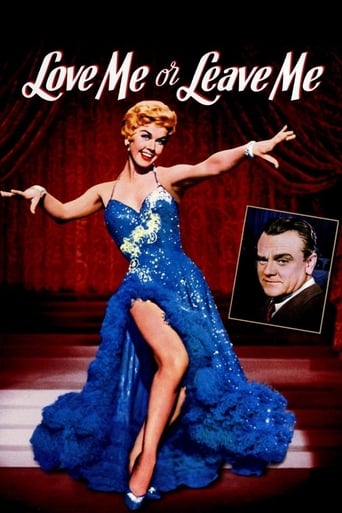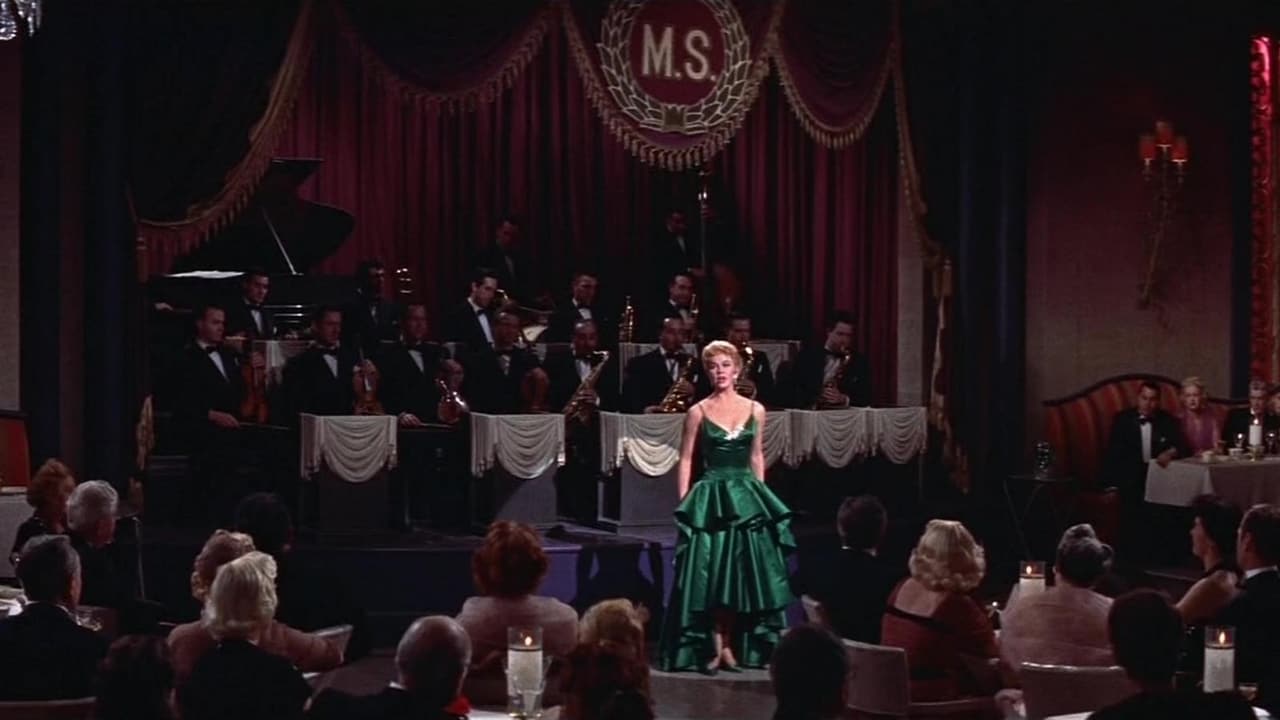SimonJack
Nobody could play a mean, nasty, unlikeable character in the movies better than James Cagney. The veteran actor proved his mettle as Martin "Marty" Snyder in "Love Me or Leave Me." Doris Day was an excellent singer and she does a very good job in this film. But, Day's voice sounded nothing like that of Ruth Etting, whom she plays here. Day's singing is robust and full of life. She plays her character that way here as well, even in the somber numbers. That's quite different from the character and musical delivery of Etting. She had a distinctive sound – higher in the early years, and somewhat nasal, but appealing in later life. And, she had a tinge of sultry about her when she sang. Etting said she would have preferred someone else to have played her in this film. If Moe "The Gimp" Snyder was as mean and bad a character as he is in this film, one might conclude that Ruth Etting was nuts for marrying him – let alone, having anything to do with him at all. But this movie is Hollywood, and a highly fictionalized account of the years of Etting's career as a singer. Without a researched biography book, too little about Etting's life is really known. And, of what has been written about her, many pieces are conflicting from source to source. At best, her past is fuzzy. One wonders why more details weren't written about her childhood and early career. Even with the scandal at the height of her career (former husband shooting current lover), Etting's life remains something of a mystery. While Day's acting is OK here, her character strikes me as too strong and determined. From what we know about Etting, she was anything but that way. Her character here seems just not right. The rest of the cast are OK. Some were fictional, others based on real people. This film is entertaining for the songs that Doris Day sings. But as a biopic about Ruth Etting it seems too unreal. Hollywood tends to glamorize the lives of musical people in its biopics. In this case, MGM did a major fictional piece with many changes in Etting's personal life. Some facts about her life and career are noteworthy for their exclusion in this film. The first is that Martin "Moe the Gimp" Snyder was married and that he divorced his wife to marry Etting. (Doesn't that throw a different light on the whole movie and its implication that Ruthie was pressured into marrying the Gimp?) The second is that Snyder wasn't a wealthy business owner and gangland boss. He worked as a bodyguard for prominent people, including those in the entertainment field, and had many contacts there. The third is that Etting's second husband, Harry Myrl Alderman ("Johnny," in the movie), also was married when he and Etting began their relationship. (After Snyder shot Alderman, the latter's wife accused Etting of alienation of affections when she filed for divorce.) From the facts known about her but not shown in this film, is it too much to wonder why Etting's career may have so soon come to an end? Some other people with Hollywood scandals survived them to go on with their careers. But, if Ruth Etting was seen as a home wrecker in the 1930s, that might have been enough to end her career in Hollywood. But why her singing career? Again, some mystery. Maybe Etting really loved Snyder and didn't care about breaking up his marriage. Or, she might have married him just for his entertainment connections, as this movie implies. That would be a reason to tolerate his crude and mean nature. Maybe she fell in love with her piano player, and didn't care that he was married. Or, she didn't care about her career at that point. The movie implies the Snyder roughneck stuff might have turned Hollywood off for using Etting in films. She starred in nearly three dozen shorts from 1929 through 1936. Most were short story plots in which she sang two or three songs. They were entertaining musically, but the acting was mostly like that of B-films. If anything, Etting seems plain or droll in her roles in the shorts I've seen. She did appear in three feature films, but only in minor roles to sing a number or two. She said herself that she didn't know how to act. Had she real talent for acting, one would think Hollywood would have ensured that she weathered the scandal and made a comeback. Rather, I think her film career never really got launched simply because she wasn't much of an actress. Without her voice, she wouldn't have been in the shorts she made. Anyway, after the scandal, she married Alderman and the couple soon after retired to live in Colorado Springs away from the spotlight. They probably had a comfortable life, because she had done very well recording more than 150 songs -- including 60 hit tunes, during the decade before she retired. In her divorce settlement with Snyder, she had to pay him $50,000.In the mid-1920s to mid-1930s, Ruth Etting was known as the Sweetheart of radio. She had a distinctive voice and was well-liked as a singer. She was a leading recording artist for more than a decade. Of her 60 hit tunes, some have been etched in musical history. Among them are "Shine On, Harvest Moon," 'Love Me or Leave Me," "Shaking the Blues Away," "You're the Cream in My Coffee," "Button Up Your Overcoat," "Back in Your Own Back Yard," "Dancing With Tears in My Eyes," "It All Depends on You," and "Good Night, Sweetheart."By the way, neither Etting nor Snyder were happy about the way this film turned out.
MissSimonetta
Love Me or Leave Me (1955) is eerily close to being a Faustian narrative, a story about an ambitious woman who basically makes a deal with the devil and suffers greatly for it even after she has attained the fame she's desired. It is also a harrowing portrait of an abusive relationship, in this case a fictionalized Ruth Etting and her manager/husband Marty Snyder, played to perfection by Doris Day and James Cagney.Though Day's characterization of Etting is not entirely accurate to the real woman, it is an interesting subversion of her "good girl" image by portraying a character who plays up an innocent image for her own advantage. From the beginning, Ruth knows that Marty expects sex (and later, romantic devotion) in exchange for her singing career; she's not naive and obviously a tough dame. But she puts on a virginal, guileless image, acting as though she has no clue as to Marty's true intentions for her and keeping him at arm's length as a result, constantly using the classic "I'm too tired" excuse. This only works for so long; eventually, after a shocking implied sexual assault, it becomes clear that Marty feels he totally owns this woman and she becomes obligated to marry him, thus sliding into total misery complete with alcoholism. This element of possession is highlighted in the film's intense sense of the male gaze, with Marty and Ruth's love interest Johnny constantly observing her on stage, silently fighting for her favor.It's strange, though, how human the writers and Cagney have managed to make Marty. Despite being obnoxious, violent, and a rapist of all things, there is a sense that he feels inadequate as a person and is holding onto Ruth not only because of twisted affection or her money, but because he has nothing else to do with himself. He's a pathetic monster and part of you reluctantly pities him.Of course, everyone else has gone on about Day's singing, which is fantastic as always, and the film's costumes, which are stunning, especially that big blue dress Ruth dons at the Follies. It's main strength does come from the performances though, and they have kept this one fresh and well worth watching.
John T. Ryan
WE SEE THAT this film is classified as being "A Musical." We beg to disagree. To our way of thinking, it is a Biopic about the life of a well known singer(albeit highly fictionalized). Any musical numbers portrayed are taking place either in an entertainment venue (night club, theater, movie sound stage) or in a practice/rehearsal. Ergo, the conclusion is: it's not a musical.FURTHER COMPLICATING THE story is accomplished with the intrusion of a local Gangster (Cagney) into the life of singer-wannabe, Ruth Etting (Doris Day). While the the story is highly fictionalized, this is one element of the story that rings true.THE STORY TRACES the relationship between the unlikely pair; starting with his observing her while she toiled as a 10 cents a dance girl. He was a racketeer, who operated a laundry business; which was supplemented with the use of good old fashioned extortion.THE MUSIC IS outstanding, the Technicolour breathtaking, the costuming first rate. Added to the 1920's sets and automobiles transform this into a first rate Period Piece.IN ADDITION TO Miss Doris Day and Mr. James Cagney, the cast features Cameron Mitchell and a cast of supporting players such as: Harry Bellaver, Tom Tully and others.WE FIND IT to be interesting and ironic that such great film work was done by both Doris Day and James Cagney at MGM: while both were under contract with Warner Brothers for so long. (Just another meaningless observation of ours.)"Recommended!"
markdaniel-576-859721
Interesting and revealing how many of the reviews here are written by Cagney fans who do not generally like Day and vice versa, so hidebound are we by styles and maybe gender. They would never have made this movie in this genre-obsessed age where actors and films must remain consistent and predictable. Here, Cagney, one of the greatest of all cinema actors, whose cocky, little man bravura is usually found in gangster vehicles (where his vulnerability beneath the sociopathic veneer always comes as a delightful surprise), combines with Day, whose sensuality and strength of feeling, though betrayed by her voice, were to be smothered in syrup in those bubblegum romcoms. Both are magnificent performers. Day plays it low-key. She keeps the passion for the singing, which is superb. Cagney's boyish swagger and confusion are heartbreaking. This is a nigh unique melodrama which defies genres and could only have worked in so wholehearted and apt a melding and transcendence of stereotypes.



 AD
AD




